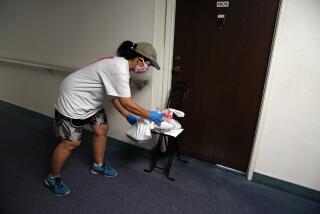Dial-a-Ride Cutbacks to Be Studied Today : Transportation: The proposals have drawn sharp criticism from both child-care groups and seniors.
- Share via
Major changes in Orange County’s dial-a-ride system, including limiting it to elderly or disabled people or eliminating Saturday service, will be considered by the County Transit District today.
The proposals have drawn sharp criticism from leaders of child-care groups who use the door-to-door service and from seniors who say loss of dial-a-ride on Saturdays would confine them to their homes for the weekend.
The recommendations are aimed at improving the cost effectiveness of the dial-a-ride system, which is heavily subsidized with tax dollars. Only about 18% of the system’s $8.3-million annual budget comes from fares.
But Tanya Voigt, executive director of the Girls and Boys Club of Fountain Valley-Huntington Beach, said that without dial-a-ride, the $4-a-day cost for their after-school program would probably triple.
“Our parents couldn’t pay for it,” Voigt said. Each day, about 300 children from 14 schools rely on dial-a-ride vans to take them to the club’s latchkey child-care program, she said.
Virginia Hill, director of Head Start preschools in Huntington Beach and Costa Mesa, said she cannot begin planning or accepting new students because the transportation of the 140 children who use dial-a-ride is in jeopardy.
Head Start’s contract with dial-a-ride expires at the end of the month, and alternative transportation would cost three to six times as much, Hill said.
Dissatisfied with the options presented by staff, Orange County Supervisor Roger R. Stanton, who serves as chairman of the OCTD board, has offered an alternative.
In a letter to other board members last week, Stanton suggested restricting regular dial-a-ride service to the elderly and handicapped but offering it also to groups such as Head Start for a one-year pilot program.
“I didn’t find any of the staff options acceptable, and I didn’t find them substantiated by any data,” Stanton said.
Elderly and disabled people told the board last month that another recommendation--to eliminate Saturday trips--would effectively imprison them at home from Friday to Monday. Board members are unlikely to choose that option.
“The argument against that was made quite convincingly,” said Tustin Councilman and OCTD board member Richard B. Edgar, echoing statements of other district directors.
But transit officials said that Saturday has been the least efficient day, with fewer riders than any other day of the week. Stanton and Supervisor Don R. Roth, another board member, have expressed concern that the system is being abused by young, able-bodied people who could use buses or other transportation.
“We want dial-a-ride to be of service to people who have absolutely no other option,” Stanton said. “We want it to be used by people for whom walking three or four blocks to a bus stop is an impossibility rather than an inconvenience.”
Other transit district officials contend that only a small percentage of the daily riders misuse the system, which is available to anyone by appointment but limited within the boundaries of small zones, each covering a few square miles.
“My contention is that people who are young and able-bodied don’t want to be bothered with dial-a-ride,” Edgar said, noting that the fare for the door-to-door service is double that of regular bus service and limits riders to small zones. “If you wanted to go across the county, you’d have to pay $5 or $6.”
But Edgar said he does not consider it misuse if a youngster going to a school event uses dial-a-ride because taking a bus is not convenient.
Dial-a-ride, which has been in operation since 1973, serves about 1.4 million people a year in Orange County. Fares range from 80 cents for the elderly and disabled to $1.70 for others.
More to Read
Sign up for Essential California
The most important California stories and recommendations in your inbox every morning.
You may occasionally receive promotional content from the Los Angeles Times.













